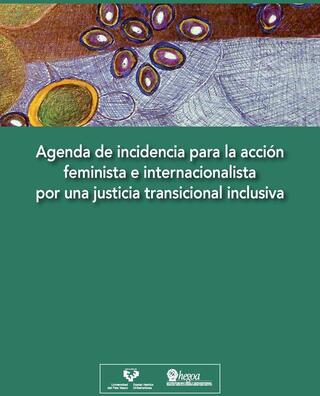

Este documento contiene reflexiones y propuestas para contribuir a generar procesos de justicia transicional inclusivos desde una perspectiva feminista e internacionalista.
La justicia transicional hace referencia al proceso político y social por el cual las sociedades buscan transitar de la guerra a la paz, y de regímenes represivos a democracias. Para que esto sea posible, la justicia transicional aborda las violaciones graves de derechos humanos que hayan sido cometidas en el pasado, asumiendo que estas no pueden obviarse, sino que requieren ser tratadas para evitar la reedición de la violencia. Los mecanismos para la justicia transicional generalmente tienden a agruparse en torno a cuatro ejes de actuación: la búsqueda de la verdad sobre los hechos de violencia, la acción judicial para dirimir las responsabilidades penales, la reparación de las víctimas, y las reformas políticas e institucionales para minimizar los riesgos
de repetición de la violencia.
_______________________________________________
Dokumentu honek trantsiziozko justizia prozesu inklusiboak sortzen laguntzeko hausnarketa eta proposamenak jasotzen ditu, ikuspegi feminista eta internazionalista batetik.
Trantsiziozko justiziak gizarteak gerratik bakera eta erregimen zapaltzaileetatik demokrazietara igarotzeko darabilten prozesu politiko eta soziala da. Hori hala izateko, trantsiziozko justiziak aipatzen du beharrezkoa dela iraganean gertatu diren giza eskubideen urraketa larriak tratatzea, ontzat emanez indarkeria berregitea saihetsi nahi bada, ezin direla gertaera horiek ahaztu. Trantsiziozko justiziarako mekanismoak oro har lau jarduera-ildoren inguruan egituratu ohi dira: indarkeria-gertaerei buruzko egiaren bilaketa, zigor-erantzukizunak ebazteko ekintza judiziala, biktimen erreparazioa eta indarkeria berriro gertatzeko arriskuak minimizatzeko erreforma politikoak eta erakundeek egin beharrekoak.
_______________________________________________
This document contains reflections and proposals which have been formulated with a view to contributing to the generation of inclusive transitional justice processes from both a feminist and an internationalist perspective.
Transitional justice is the political and social process by which societies seek to move from war to peace and from repressive regimes to democracy. To make this possible, transitional justice addresses such serious human rights violations as were committed in the past, assuming that these cannot be ignored: they need to be dealt with to prevent the repetition of violence. Mechanisms for transitional justice generally tend to cluster around four axes: the search for the truth about violence, legal action in order to settle criminal liabilities, reparation for victims, and the political and institutional reforms that are necessary to minimize the risk of recurrence of violence.
Presentación
1- Premisas de partida
2- Aspectos comunes en la violencia contra las mujeres
3- Aspectos comunes en la acción de las mujeres contra la impunidad
4- Propuestas para una agenda de justicia transicional inclusiva
- Derecho a la verdad
- Derecho a la justicia
- Derecho a la reparación
- Garantías de no repetición
_____________________________________________
Aurkezpena
1- Abiapuntuko premisak
2- Emakumeen kontrako indarkerian alderdi komunak
3- Zigorgabetasunaren aurka emakumeen ekintzan alderdi komunak
4- Trantsiziozko justizia inklusiborako agenda baterako proposamenak
- Egiarako eskubidea
- Justiziarako eskubidea
- Erreparaziorako eskubidea
- Errepikatuko ez delako bermea
____________________________________________
Introduction
1- Initial premises
2- Common aspects of violence against women
3- Common aspects on the political action of women against impunity
4- Proposals for an agenda of inclusive transitional justice
- The Right to Truth
- The Right to Justice
- Right to reparation
- Guarantees of non-repetition